Itzulia Basque Country: Those fleeting moments that made the race
From Roglic's long wait in the hot seat to that final winning pact
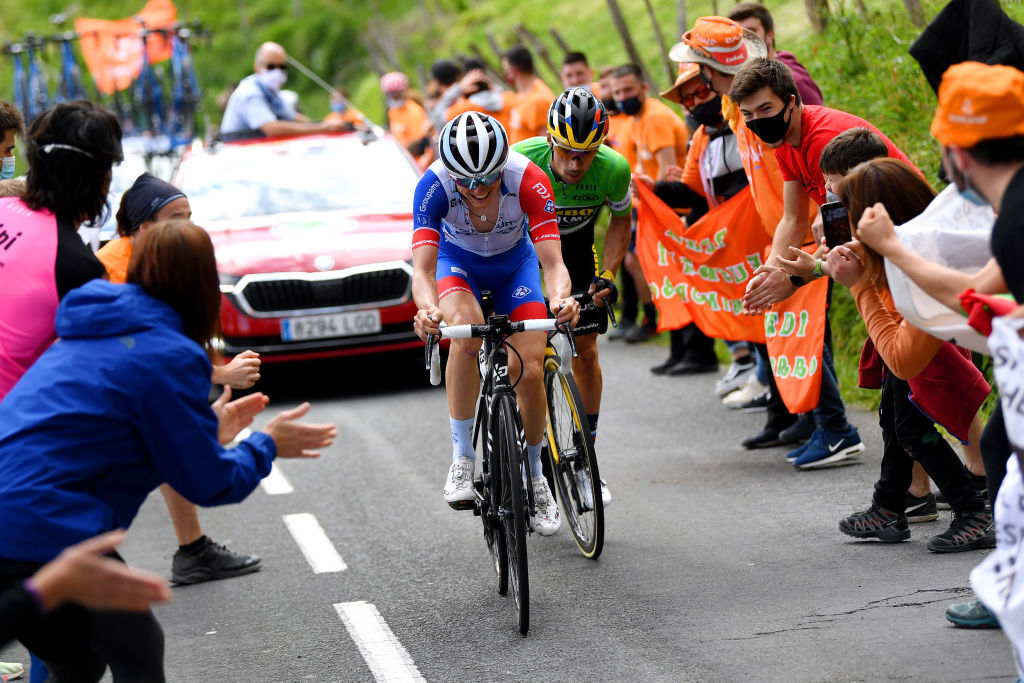
Stage races span weeks and each of their days span hours, but they are won and lost in brief, fleeting moments. Itzulia Basque Country is no exception.
Stage 1
Our drama begins on the very first day with the individual time trial in Bilbao, and the first decisive moment is not even caught by the cameras. We see Primož Roglič for the first time since his devastating mishap in Paris Nice sitting in the hotseat, checking his phone. He looks bored. He probably is – he’s got a long wait ahead of him. Earlier that afternoon, warm sun casting shadows in the courtyards of apartment blocks and long boulevards lined with fine architecture, Roglič rode his bike along stretches of highway, up eleven-percent climbs, traipsing through all kinds of urbanism, through parks and streetscapes, in and out of town. He did so quietly and will finish first.
Having a time trial at the beginning of a stage race sets up the time gaps that will, for the most part, go on to define the battle for that race’s general classification. Roglič, for his part, seems rather nonplussed by the whole situation. He’s won here before, plus he’s here with a very young team, not the usual Jumbo-Visma powerhouses.
However, there’s an elephant in the room, one that the commentators can’t help but discuss: Tadej Pogačar (UAE Team Emirates) is here too. It’s the first time they’ve gone toe-to-toe in a stage race since that infamous Tour de France and both of them look remarkably strong, Roglič having won three stages in Paris-Nice and Pogačar already carrying victories from the UAE Tour and Tirreno-Adriatico. In fact, the whole season had felt like an arms race between the two Slovenians, and now, in Bilbao they meet.
The story is not all about them, however. In the time trial, two other contenders emerge, teammates of our rivals – Jumbo-Visma’s Jonas Vingegaard, fresh from having won Settimana Internazionale Coppi e Bartali a week before, and UAE Team Emirates’ Brandon McNulty, who displayed his strength quite well in last year’s Giro. McNulty is a time trialist, full stop, and he finishes second to Roglič by only two seconds. Vingegaard, while known for his skills as a climber with a punchy finish, does better than anyone could have possibly expected, finishing only 18 seconds behind his leader. Pogačar, for all his hype, has a good but underwhelming run, finishing 28 seconds down on Roglič. In the corner of the screen, the Jumbo-Visma rider, in the hotseat, shows no emotion when he gets the news. Roglič knows it will be a long week.
Two teams - Jumbo Visma and UAE Team Emirates - and four men - Roglič, Pogačar, Vingegaard, and McNulty - are our main players. They are, however, by no means the only ones. Using our 2020 hindsight, in these types of situations we expect Jumbo Visma to dominate, control the race from day one, forming a powerful train and ensuring no attacks go un-countered. Such is not the case this time, for their young team is here to learn more than anything else, and Roglič is almost a father figure to them, a shepherd to the Lycra-clad sheep. It’s the perfect race for the youngsters to gain knowledge and experience – high stakes and deeply technical, all while having the pressure to win somewhat reduced seeing as Roglič already has Itzulia on his palmarès.
The fact that there is no explicitly dominant team in the peloton for this race changes the dynamics completely. It makes it very, very exciting.
The latest race content, interviews, features, reviews and expert buying guides, direct to your inbox!
Stage 2
Our contenders may come from two teams, but it is a third, Astana-Premier Tech, who create the moments in which chaos prevails over order. There is a lesson learned on the second stage, and that lesson is: when in the Basque Country, follow the Basques. An ancillary lesson: this race will be won not on its arduous climbs but on its perilous descents.
Let’s start at 19 kilometres to go. Flanked by dense foliage and dubiously masked spectators, the men are climbing La Asturiana, a Category-2 climb, the final hill of the day. The breakaway is caught when David Gaudu (Groupama-FDJ) speeds off the front. In his wheel is Pogačar. The players assemble. Around the hairpin, Richard Carapaz (Ineos Grenadiers) goes down unexpectedly, and Gaudu and Pogačar take advantage of the ensuing chaos behind. This is bad news, seemingly, for Roglič, who is isolated, with no teammates off the front. Vingegaard, who is riding for GC as well, trails comfortably at the back of the pack – shielding his leader from the wind is not his job this time, it appears. That’s all he has to do this whole week: ride quietly.
Pogačar and Gaudu can’t hold their gap and it all comes back together. Things are antsy as, in a one-week stage race, all days are GC days. They’re fighting for position in the final 2000 metres of this climb. There are 16 kilometres left. Max Schachmann (Bora-Hansgrohe) attacks, followed by Roglič and EF Education-Nippo's Sergio Higuita. A gap of 10 seconds forms. Pogačar has burned too much of his candle and sends McNulty up to track Roglič.
At 13.6 kilometres to go, the riders from this area - Pello Bilbao of Bahrain Victorious, Alex Aranburu and Omar Fraile of Astana - all push to the front as they head onto the descent, which is a tricky one. They do so because they know these roads better than anyone else, their wheels are at home on their slick, mountain-shadowed tarmac. The men out front could win this stage, but they won’t. The road is narrow, and they are skittish, not confident in the descent, which winds at a blistering pace. They’re all thinking about Roglič’s crashes at Paris-Nice. McNulty constantly looks around. A sketchy corner, bumpy and tight. Brakes are audible. Roglič and Schachmann are caught while McNulty and Higuita continue, but not for long.
Astana know that they are the strongest team at the moment and so they hash out a little strategy. At 10.6 kilometres to go, Fraile goes off the front of the peloton, spurs on a chase behind as his teammate Aranburu gets in position. They’re thinning out the bunch, making use of each corner, assuring that no team can come to the front and shut them down, which is bad news for Movistar, considering that was their planned tactic for the day. Astana’s plan is executed with finesse. In the fog of chaos they’ve engendered, Aranburu attacks. What he does after that is a masterclass.
Aranburu is 30 seconds down on GC, and while he’s not the kind of rider who excels in the steep mountain stages that decide races like these, if he opens up a significant advantage, it could be rather annoying to bring back. So the peloton chases, led by UAE’s Marc Hirschi, but they can’t catch Aranburu - no one can. Aranburu takes every single risk, winds through every single corner with grace and ease, impossibly fast, and through each one he pulls time on his pursuers. It’s dangerous riding, but he knows these roads – he’s been practicing, and this is his moment. He seizes it beautifully. By the time he gets down to the bottom, now surrounded by the urban fabric, he finishes with 17 seconds to spare.
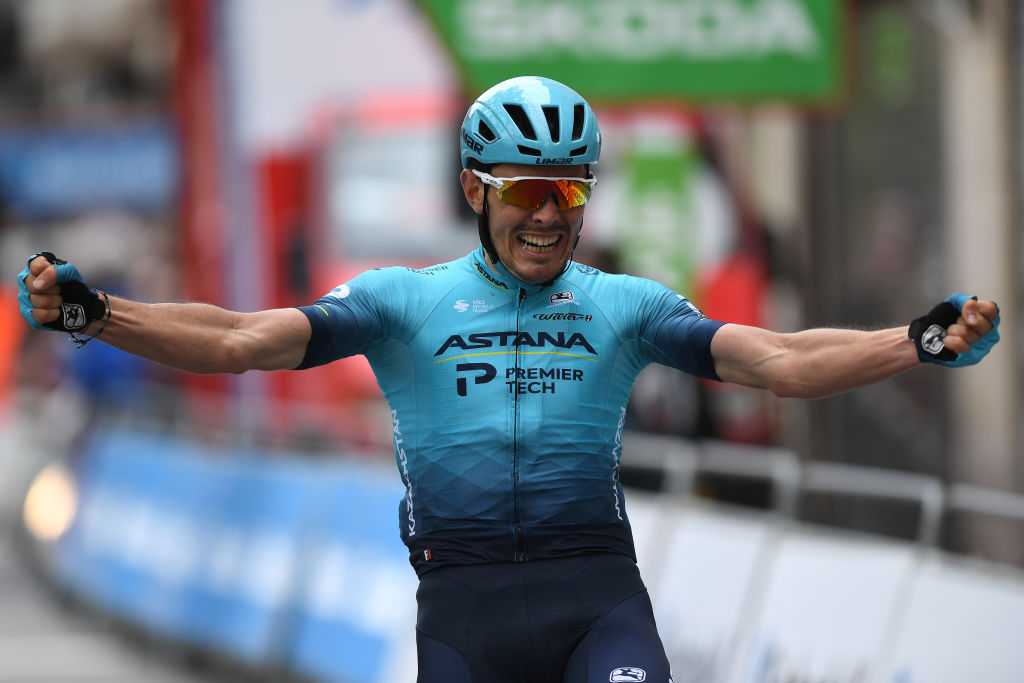
Fraile, as though being rewarded for his clever work earlier, snatches up second place, followed by Pogačar, who needs the bonus seconds. The threat of rain never materialises and, under a dark grey sky, the two men in aqua blue kits celebrate while their weary competitors wheel around barriers, into the arms of their soigneurs. They’re already thinking about tomorrow.
Stage 3
Usually when a cyclist wears the leader’s jersey in a stage race, it becomes the responsibility of their team to control from the front of the pack, closing down any threats and thus ensuring the safety of the leader’s position. Jumbo-Visma, however, do not assume this responsibility for one simple reason: they can’t.
One would think, based on the what we’ve seen on-screen, that their squad comprises only three riders: Roglič, Vingegaard and the domestique Antwan Tolhoek. After a good run in the time trial, Tobias Foss pretty much disappears. Sam Oomen shows up from time to time, specifically in the last stage. Lennard Hofstede and Christoph Pfingsten are nowhere to be found, ever. As a result, Roglič and Vingegaard become isolated, which puts both at risk.
Santa Maria del Yermo is the name of the category-1 climb that concludes today’s parcours, no friend of gravity with 3.1 kilometres at 10.2 per cent and a maximum of 20. The mountains are a great filter and on them, the weak are separated from the strong. In the mountains, one could throw all the money and technology in the world at a man and he’d still crack under the weight of his own body, still lose the battle with physics.
At 2.6 kilometres to go, the bunch are all together on the final climb. Pogačar rounds a steep corner, his characteristic tufts of hair poking out of the top of his helmet, lips parted to reveal his big white teeth. The scrappy efforts of his team have paid off, and they have delivered him perfectly at this decisive moment. Who else is on Pogačar’s wheel but his friend-rival-compatriot Roglič? Pogačar ups the pace and the peloton is instantly in shambles behind. Fractured. Ineos Grenadiers’ Richard Carapaz picks it up at the front.
When there is 2.1 kilometres to go, Pogačar attacks, Roglič right behind. Just like that, it is decided. The gradient is 20 per cent, back-breakingly steep. Scraggly pines cast mottled patches of darkness onto the winding narrow road. No one can go with the two Slovenians. They are in a league of their own. One looks back and the other is always there, and they are constantly looking back. Adam Yates (Ineos Grenadiers) tries to bridge, and it appears as though things will regroup once more. 1500 metres. Pogačar attacks again, making it look easy, and there’s Roglič, of course there’s Roglič, for the two are in an existential battle, their narratives locked inextricably forevermore. This is just one of many episodes during which said battle plays itself out.
Fans on the side of the road shouting, the greenery of the trees, the grinding of pedals, turning over of wheels on roads it is rather insane to ride a bicycle up. They trade turns, watch each other, no longer caring about the men behind. Gaudu manages to grab Roglič’s wheel, and uses the chance to launch. Mikel Landa (Bahrain Victorious), Alejandro Valverde (Movistar), Adam Yates (Ineos) join them. It’s a sextet now.
The final sprint. Roglič throws his bike forward, his face one of pure determination, and Pogačar is on his wheel, and soon all the others are distanced. Roglič and Pogačar, side by side and the line is there, but Roglič has gone too early, and Pogačar has saved his energy. As they fly under the banner, Pogačar, victorious, throws his hands up, a boyish grin on his face, as though he’s still surprised at having beaten his onetime-hero, who shakes his head, turns off his bike computer, annoyed with himself.
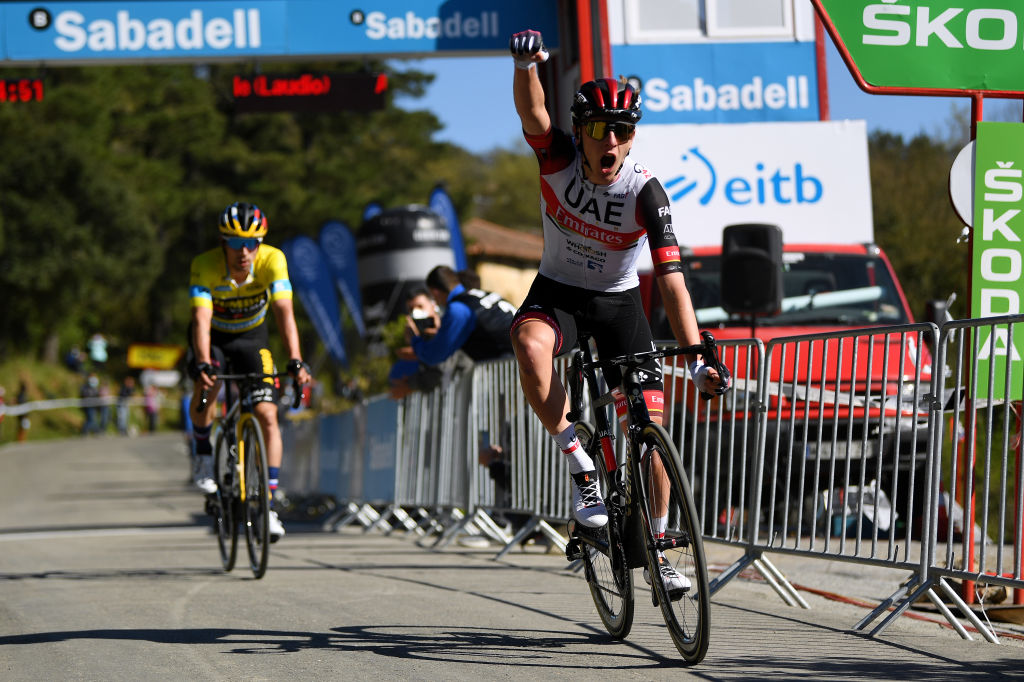
It looks as though Itzulia’s going to be the Pog and Rog show from now on.
But then, it isn’t.
Stage 4
As I said earlier, stage races are long, but they are decided in brief, fleeting moments. There are two of these left in Itzulia Basque Country.
At 25 kilometres to go, on the final climb of the day, Erlaitz, a category-1 wall, Astana once more pick up the pace, doing their work as this race’s chaotic catalyst for drama. Instantly, owing partially to the narrow winding roads, Roglič goes from having three teammates surrounding him to having one. They manage to regroup somewhat, but changing position is difficult in moments like these and the only one who can manage getting to the front is Vingegaard.
Landa attacks. Team BikeExchange’s Esteban Chaves follows Landa, McNulty follows Chaves. The trio open up a small gap. Vingegaard’s at the front of the peloton, Pogačar and Roglič in his wheel. It’s likely that UAE have sent McNulty up the road because they know Pogačar’s being marked by Roglič the entire time, which is true. McNulty’s third on GC, Landa is seventh – letting them get away is out of the question. Chaves is dropped. There are 866 metres of climbing left and Tolhoek is dropped off the back of the pack which is bad news for Roglič, who’s now alone with only Vingegaard for company. The Dane closes in on the two leaders and the two groups are reunited. Onto the descent, and McNulty has another dig, Vingegaard immediately in his wheel. It’s strung out now, all in a line. Chaves isn’t giving up and he and Pello Bilbao (Bahrain Victorious) make a break for it.
It’s stupid how it happens, really.
At 20.6 kilometres to go, the men enter the feed zone. The camera centres on Chaves and Bilbao, zooms in on their determined faces. When it cuts back to the pursuers, suddenly a gap has opened in front and Roglič and Pogačar are left out of it. Why? Because Roglič is distracted, fiddling about in his pockets, throwing his litter away and Pogačar is, well, only concerned with Roglič.
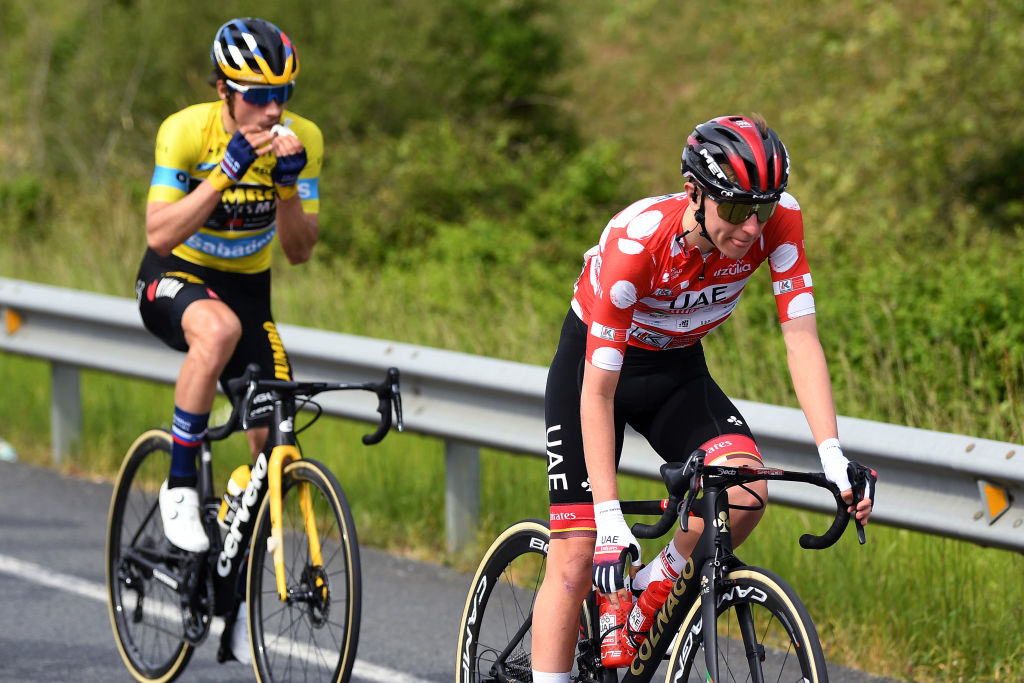
Meanwhile, McNulty, Vingegaard, Astana’s Ion Izagirre, and Bora-Hansgrohe’s Emmanuel Buchmann have joined up with Chaves and Bilbao. The group has daylight and never comes back.
Roglič and Pogačar are marking each other out of contention, neither wanting to go on the attack. This is a difficult situation, and neither leader is quite sure what to do. Both of them have their teams’ other GC men out front. Maybe Jumbo and UAE decide to let Vingegaard and McNulty try for the stage, who knows, but both are high up on the general classification. It’s other teams’ responsibility to chase but the chase is fractured and never becomes cohesive. The gap grows to over 30 seconds and soon Roglič is no longer in the virtual yellow jersey. Tolhoek manages to come back at some point, but it’s too little too late. They won’t want to burn him out too much – they’ll need him for later. At the front, Vingegaard rides smart, doesn’t take any turns, conserves his energy and the others tow him along. Izagirre wins the stage. By the time the pursuers cross the line, they’ve lost 50 seconds to the leading group.
It’s an obvious tactical error by Jumbo-Visma with the positioning at the start of the climb all wrong and so was Roglič taking food at a time when attacks were flying off the front. The loss of Tolhoek at a critical moment prevented them from having an extra man to either go with Vingegaard to slow down the leading group or stay with Roglič and help the chase when they could’ve still brought it back. Alas, it’s a blunder for UAE, too. This now puts Pogačar even further back on GC and while it catapults McNulty into the lead, the team now have to decide which of the two men they’ll ride for – McNulty, who’s already got time on Roglič, or Pogačar, who’s far stronger on the climbs that will dominate the final stage of this race. Jumbo Visma, meanwhile, have no such leadership questions.
Everything is in play now.
Stage 5
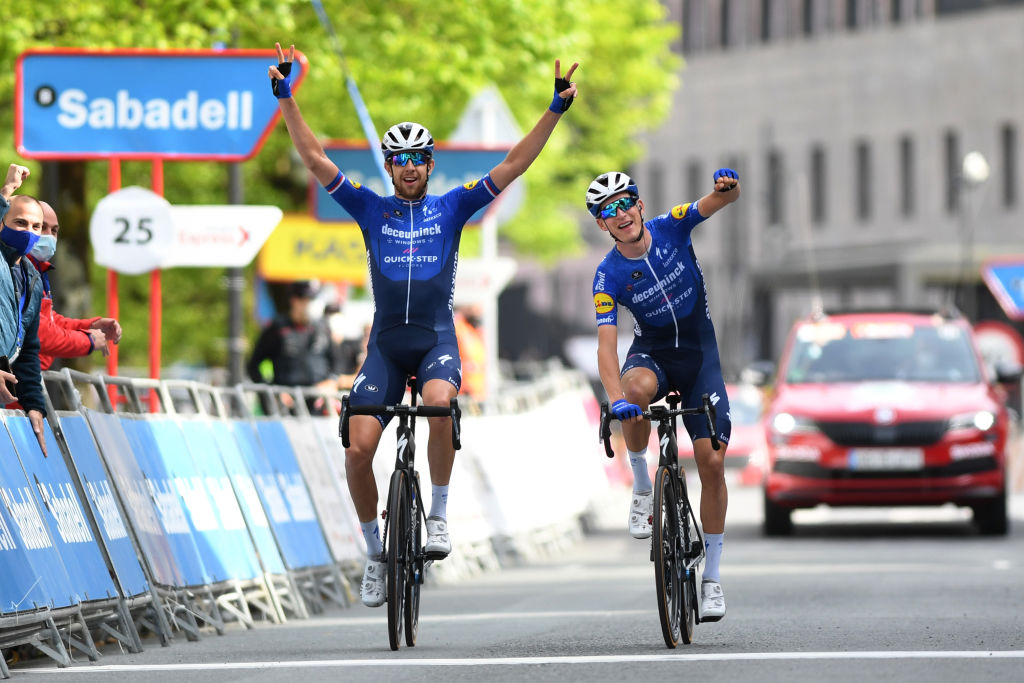
On stage 5, everyone takes it easy and it’s a day for the breakaway, with Mikkel Honoré and Josef Cerny, both of Deceuninck-QuickStep crossing the line in tandem, as teammates. The GC men ride furtively, saving as much of their energy as they can, as does the rest of the peloton, for they know anything can happen on the final day with its seven hellish climbs. Hence, the break gets away. Hence, Honoré and Cerny are the only ones left smiling at the end of the stage. Everyone else is asking questions of themselves.
Stage 6
The final stage of this race is like a grand synthesis of everything else that’s happened thus far. Sometimes, cycling is a battle of pure strength and sometimes it is a battle of strategy. In this case, it is the latter. The set-up for the finale happens before the cameras are rolling. Jumbo-Visma have put Tolhoek in the breakaway, which consists of some very strong riders already: Carapaz, Hugh Carthy (EF Education-Nippo), Fraile, Enric Mas (Movistar), Patrick Bevin (Israel Start–Up Nation) and Ben O’Connor (AG2R Citroën Team). A group of this kind of quality could easily stay away for a good while.
There are 77 kilometres to go and Bahrain Victorious’ Mark Padun attacks with Carlos Verona of Movistar, causing a major split in the peloton. They hit the base of the first hill, the Azkoitia, a category-1 climb 9.6 kilometres in length with a 5.7 per cent average gradient. Roglič sends Sam Oomen ahead and UAE send two of their representatives as well. It’s an arms race between the two of them, and the two teams shut it down. It’s back together. Verona and Padun bridge to the first group. The gap shrinks to 15 seconds as the GC men all eye each other at the front of the pack before UAE take the helm with Hirschi keeping everything under control. This early in the day and it’s already full gas racing.
This is all very unfamiliar territory for UAE Team Emirates. They aren’t used to having more than one leader in a race. They aren’t used to taking the offensive as a team, aren’t used to riding as a train. Riders like Hirschi and Pogačar aren’t used to working as super-domestiques and McNulty isn’t used to riding for GC in a major European stage race. UAE have taken a gamble on riding for McNulty. They seem to think that the time he’s got on Roglič is enough to hold him in GC despite the heartbeat-like profile of the sixth stage. Pogačar is now riding as back-up, something he hasn’t done since the start of the 2019 Vuelta a España, where he originally acted as support for Fabio Aru before it became abundantly clear that the Slovenian was the stronger rider of the two.
All Brandon McNulty has to do to win this race is hang on. He doesn’t have to go on the attack, doesn’t have to do anything flashy. All he’s got to do is stay in the wheel. But can he?
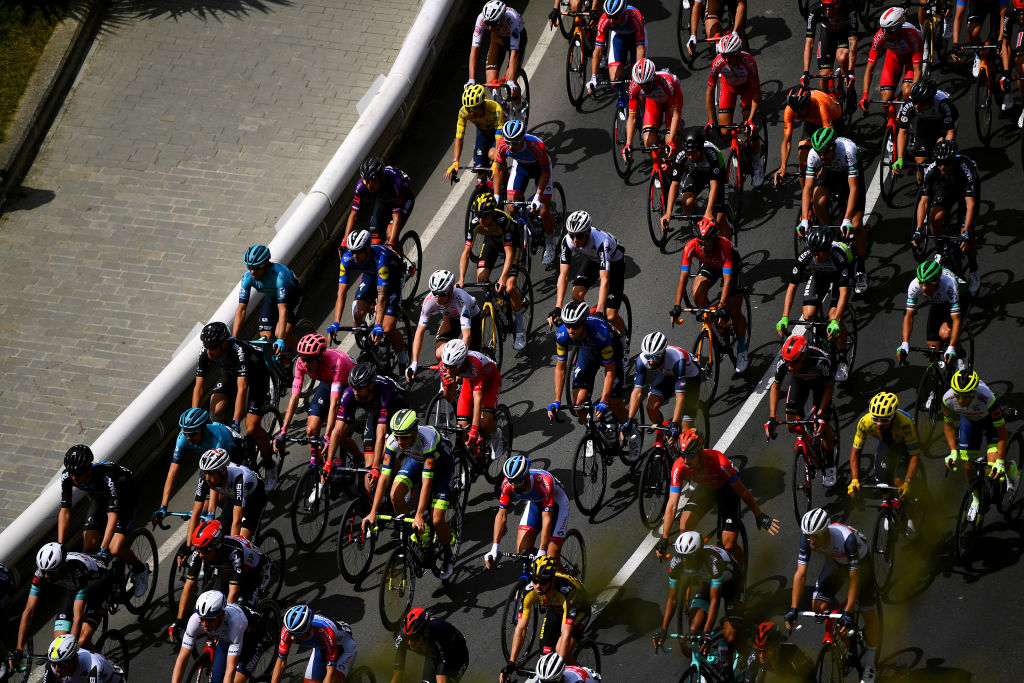
At 72 kilometres to go there is an attack from Deceuninck-QuickStep’s Mauri Vansevenant, who is followed by Oomen, Hirschi, and Team DSM’s Ilan Van Wilder. UAE want someone in the break, Jumbo-Visma wants someone to make sure UAE don't get a single advantage. The breakaway is remarkably strong and Van Wilder and Vansevenant probably think that, despite the insanity behind, it’ll last. 69.4 kilometres to go and the group bridges the gap. Only 1,500 meters until they crest Elosua-Gorla, the fourth climb of the day, a category-2 beast. Three more remain, two of which are in the first category, the hardest, most arduous. Every climb is a proving ground, a chance for things to be shaken up irrevocably.
The moment that decides the outcome of this race, just as was the case on stage 4, happens on the descent.
At 67 kilometers to go Astana send two men up front, Ion Izagirre and the star descender from stage two, Aranburu, thus completely cutting off UAE. The pair practically throw themselves down the hill, a rider from Cofidis behind them and, following, Gaudu, Valverde and Roglič. Things stay together but only barely. At the front of the race, the breakaway splinters, falls apart, explodes. Riders are scattered all over the hills and it’s hard to keep track of who is where.
Back in Group 2, Landa tries to bridge to Roglič. Where are Pogačar and McNulty? Not where they need to be – a few positions down from Landa. The elastic is tenuous. Roglič has learned his lesson from stage 2: when in the Basque Country, follow the Basques. Right now, the gaps are bridgeable, if you’re a good descender, but that requires taking a great deal of risks. Landa and Valverde are willing to take those risks because they are familiar with these roads and Roglič is willing to take those risks because he knows that this has the potential to be the winning move. All the UAE boys can do now is try and stay in the wheel, but again, the gaps are small. McNulty, shielded from the wind by Pogačar, isn’t as strong a descender as the super-domestique keeping him safe around all those tight corners, but he hopes that the distance won’t grow. It’s a massive error on his part.
Aranburu is presenting yet another masterclass on how to make the most of each and every perilous twist and turn that outlines these lush, pastoral hills, and this is very good for those others in attendance, for they can watch the experienced descenders take each line and follow it cleanly. They can also ride with more confidence because they know they have confident men in front of them. The whole group works because of this interesting symbiosis and because any distance on the yellow jersey is good distance. Meanwhile, up front, everyone save for Bevin, Carapaz, and O’Connor drops back. The Jumbo riders have done extremely well for themselves because Roglič is coming and he’ll have two men readymade up front to help tow him along. UAE have Hirschi, but will it be enough?
Once the descent evens out, group two has got around 15 kilometres of flat terrain ahead of them. If Roglič’s group want to keep their gap on Pogačar and McNulty, they’ll have to time trial it hard. At 56.8 kilometres to go the Roglič group meets up with the remnants of the earlier breakaway. 10 seconds behind is the leader’s jersey group - only 10 seconds. The camera pans towards them and McNulty has just Pogačar for company - that is, until Hirschi drops back to wait for them. In the wheel of McNulty is Vingegaard, marking him, his face expressionless.
The gap grows to 20 seconds, simply because everyone in the front group wants McNulty and Pogačar gone. Astana wants them gone, Landa wants them gone, Valverde wants them gone, Roglič and his two domestiques definitely want them gone. And so, they all work together and push a blistering pace. In the pursuing group, riders like Chaves and Yates don’t want to take turns – Yates has Carapaz up front and Chaves is thinking about the stage. Bilbao also has Landa in the Roglič group. Vingegaard is there to make sure none of them go solo. UAE suddenly find themselves in a very difficult strategic situation. But from Jumbo-Visma, this is, for once, a tactical masterclass.
The gap holds at 23 seconds. Soon it will be 30, 43. Then at 51 kilometres to go the rest of the breakaway is caught. We can ask ourselves in this moment, how could UAE let this happen? Was Pogačar too concerned with McNulty to notice Roglič going off the front on the descent (much like McNulty did to Roglič in stage 4)? Did they just assume that the gaps wouldn’t grow that much or that they could be bridged on the ensuing climb? Was it a crisis of leadership? Did Pogačar want to bridge but then was told to hold back? Perhaps we will never know. For now, in the verdant valley of Soraluze, they persevere. The race footage is interrupted by an interview from Pogačar.
"Today the strategy is to defend the yellow jersey. We’ll do everything we can and I think Brandon is super good and the team also. We have good options."
It is not an optimal time to show that interview.
That these men have to spend their energy before the terrible climbs to come does not bode well for them. The truth of the matter is, Roglič took a significant risk on the descent that McNulty did not want to take, and Pogačar was left having to help the American on the way down instead of fighting for his own chances, though it is not McNulty’s fault that Pogačar is in this situation. This was a team error. Not having clear, strategic leadership goals in anticipation of this final stage cost them. Not sending someone up to the breakaway earlier like Jumbo-Visma did cost them too.
Jumbo learned from what had happened in the descents on stages 2 and 4 and adapted to similar, race-changing situations. When Izagirre and Aranburu came to the front, Roglič knew immediately that this is where things were going to shift dramatically. In the descent’s chaos, Roglič kept Vingegaard behind to keep watch on Pogačar, meanwhile Pogačar and McNulty completely lost Majka and Ulissi somehow. Having Tolhoek and Oomen from the breakaway was invaluable, as was joining with riders from other teams who also had men in the breakaway, which gave everyone the incentive and ability to take turns at the front, growing the gap.
The men reach the foot of the Eibar, the toughest climb of the day. Five kilometres at 9.5 per cent. Like I said earlier, the mountains are a great filter. They claim Hirschi first. On the front of the pursuing group, Pogačar purses his lips, grits his teeth. It’s unusual to see a man so often praised for his serenity and level-headedness so visibly angry.
At 46.1 kilometres to go, the sun bathes the bald, rolling hillsides in the afternoon glow of fresh spring. Wildflowers poke out from mossy rocks which flank one side of the road. This sport has a knack for casting heartbreaking moments against the loveliest of places. Around a narrow hairpin corner, there they are, the faces of labour. Pogačar looks over his shoulder, shouts some words, to push McNulty on, but he cannot. He lumbers the pedals over one at a time, barely moving forward at all. Their companions start the next part of their climb with no regard for the men trailing behind.
The boyish man in polka dots has to make a choice now, a difficult one. He has already sacrificed so much for the American, has already done so much to ensure his charge’s safety and success. He has been a good domestique, the best he could possibly be, but his job is coming to an end. Pogačar talks into his radio, glances back. McNulty raises his head, gives a little nod: go on. They are separated. Pogačar only looks behind him a few more times in the hope that his teammate will suddenly be behind him. It is a fruitless hope, and at a certain point he steels himself. Forward is the only way to go, and he’s got a lot of time to make up.
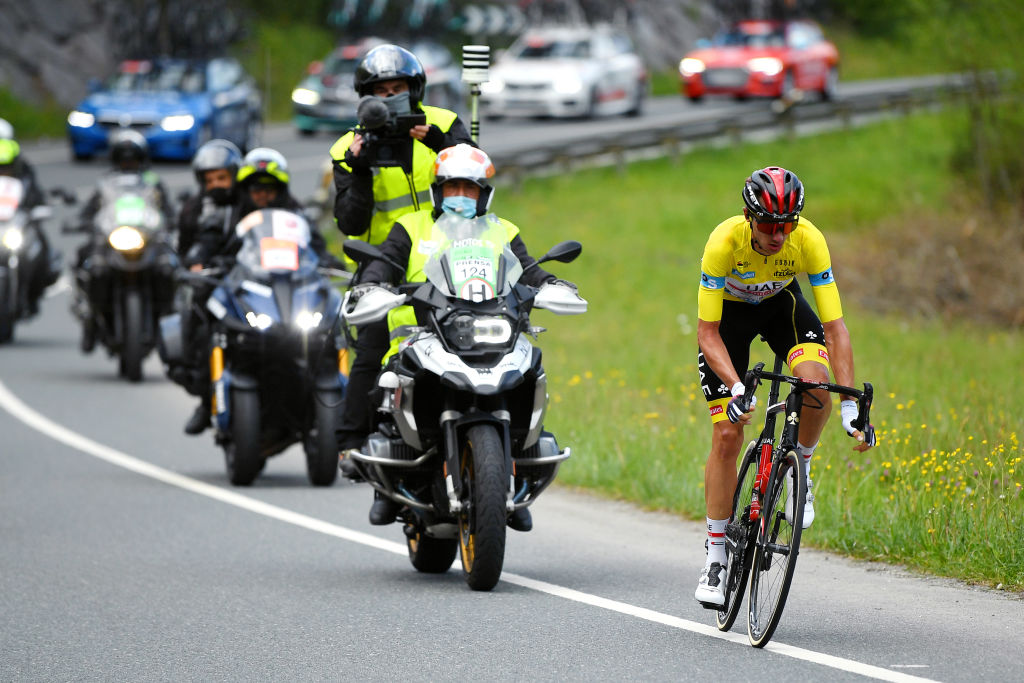
McNulty’s not the only one to drop. Eibar claims a handful from the front group: Oomen, Tolhoek, Bilbao, Landa, Valverde. Slowly but surely, through attrition alone, the pack at the front is thinned out, thanks mostly to the efforts of Roglič, who surely has gotten the word that McNulty is gone, thus leaving his frenemy Pogačar to his own devices, and the gap is under 20 seconds again. Soon, under Roglič’s tenure at the front, the group is whittled down to just three of them: Roglič, Gaudu, and Hugh Carthy, from the original breakaway. This is how it will stay for the next 40 kilometres. Carthy, Gaudu and Roglič all work together, take turns without complaint. It’s in their best interests; none of them want the likes of Pogačar or Valverde to come back.
Meanwhile, Pogačar is upset. He works on the front, tirelessly, keeping the gap manageable but never bridging it. His chances of winning this race are over, but there’s a podium to contest. With McNulty gone, Vingegaard has quietly moved up into second place on GC. He stays in Pogačar’s wheel, watching him, never once taking on the wind for anyone. Occasionally Yates will come forward to pull, Valverde maybe, but the onus is on Pogačar to work, and he does because he has the legs to, because he wants to stay in control after losing that control for the past two days.
This is an important moment for this young man, once thought to be unstoppable. For 40 kilometres, Pogačar pulls everyone else along, commits himself to doing so, for he knows no one else will. The only reward for his labour comes in the form of showing everyone that, in doing this, he too is strong. He is not going to win this race, but he damn well could have. Every time the Slovenian looks over his shoulder, he sees the stoic visage of the young Dane, Roglič’s teammate. That pale face adds quite a bit of insult to injury.
Up at the front, Roglič is fancying himself to be a little bit Machiavellian today. He makes a pact with Gaudu, who is clearly the freshest after Roglič’s many pulls at the front. You tow me to the line for GC and I’ll give you the stage. Gaudu smiles. He really wants the stage. But then, there’s the matter of Carthy, their third wheel. They’ll have to time this right. 15.9 kilometres to go. Gaudu attacks on the final climb, but it’s too soon. Roglič is caught out and the Frenchman slows up to allow him to follow. Thus, their pact is revealed to the world. They wait 10 kilometres to try again.
At 5.9 kilometres to go Gaudu takes another dig. This time, Roglič is recovered enough to immediately follow. They take their hurried turns, and Carthy drops like a stone, just as they planned. As they reach the finish line, Roglič and Gaudu bump fists, and when they cross it, both celebrate, their faces split with ecstatic grins. Gaudu takes the stage and Roglič has won Itzulia Basque Country for the second time in his career, doing so handily on the last day in a brilliant display of making the most out of the team one is given.
Thirty-four seconds later, the pursuers round the corner – Valverde, Yates, Pogačar, Vingegaard. Pogačar has managed to beat out Yates for third in GC. It’s a bittersweet victory for him, especially since McNulty ends up finishing 17th overall. The shadow success story of this race, however, is Vingegaard, who, by racing quietly and with great cleverness and perseverance, has sailed effortlessly into second place. In the end, Jumbo-Visma secure all four jerseys, three of which go to their Slovenian leader (Vingegaard wins best young rider). Once more, after a terrible loss in France, Roglič finds redemption in Spain. For a split second, the camera pans to Roglič and Vingegaard as they enter the trailer to prepare for the podium presentations. Roglič rests a hand on the younger man’s shoulder, smiles brightly at him.
"I’m proud of you," he says. This, from a man not known for moments of great tenderness. On the podium, Roglič stands sandwiched between Pogačar, the future of cycling in their shared country and Vingegaard, the future of cycling on his own team.
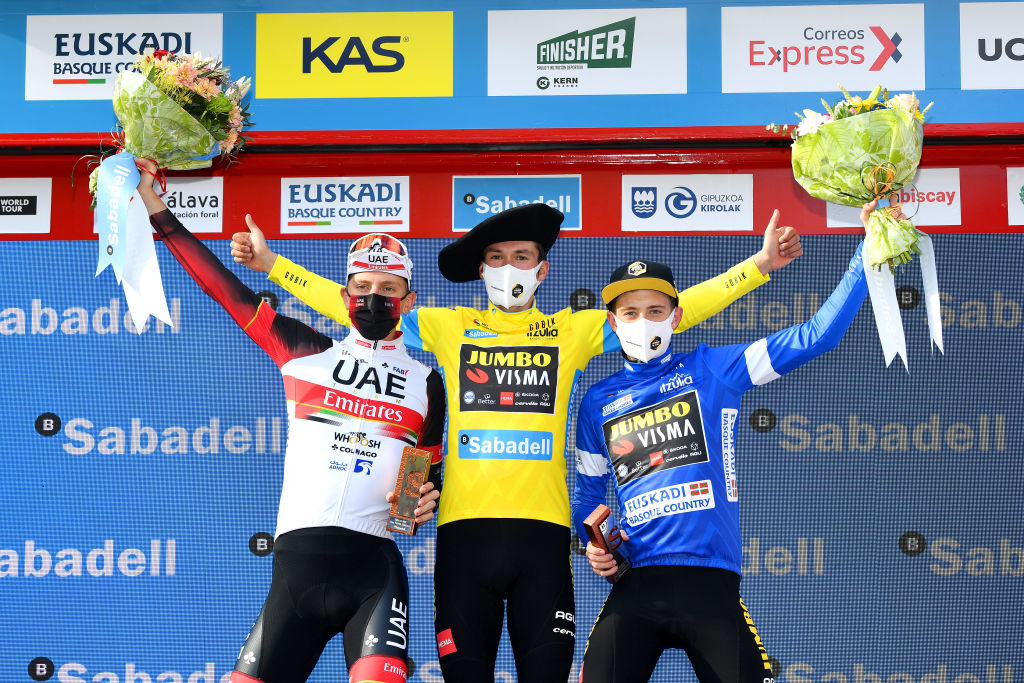
In the end, it’s a lovely place for Roglič to be.
Kate Wagner is a Chicago-based writer and critic. Her work on cycling can be found in various publications including Bicycling Magazine and in her newsletter, Derailleur.
Kate Wagner is a Chicago-based writer and critic. Her work on cycling can be found in various publications including Procycling. Her newsletter covers cycling in an unconventional fashion, featuring essays, short stories, multimedia works and illustration.
She can be found Tweeting at @derailleurkate